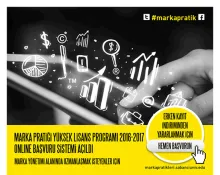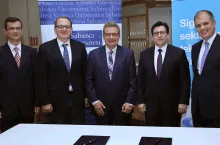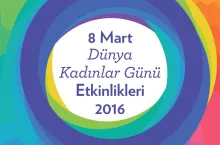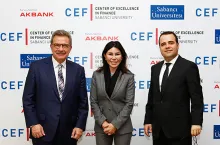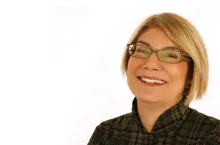24/03/2016
-Information Technologies Non Thesis Program: This program creates an opportunity towards a career in the IT area for newly graduates and those professionals planning a major change in their career track. The curriculum has a rich enough spectrum that's suitable for IT professionals as well who would like to improve their skills and broaden their expertise in the area.
-Data Analytics Non Thesis Program: This program creates an opportunity towards a career in Data Analytics area for graduates of disciplines such as computer science, engineering, mathematics, physics, statistics, economics and other fields with a quantitative focus and for professionals who have ample work experience in a data-analytics-related area and are seeking in-depth training in Big Data Analysis.
-Energy Technologies and Management Non Thesis Program: This program creates an opportunity towards a career in Energy area for graduates of disciplines such as engineering, basic sciences, economics, management, politics and other fields with a quantitative focus and for professionals who have work experience in energy or other related areas .
The candidates who have completed a undergraduate program are eligible to apply to these programs. Newly graduate candidates should complete their undergraduate degree till
08th September, 2016.
Application Documents and Requirements:
1. Completed Online Submission Form & Specific Requirements Form
2. Official Transcript: Sealed and taken from Student Affairs of the applicant's university indicating the courses and grades taken.
3. Two Letters of Recommendation: These should be either submitted online or posted in a sealed envelope. For the sample letter please click here.
4. English Proficiency Exam Result: Any of the following test results baring the min. Scores and which are within the validity period as indicated below. Photocopies are acceptable for application, but original copies should be submitted during admission.
TOEFL : Min. score 78 in Internet-based test, Min. score 210 in Computer-based test, Min. score 547 in Paper-based test.
IELTS : Min. score 5.5
KPDS : Min. score 65
ÜDS : Min. score 65
YDS: Min. score 65
e-YDS: Min. score 65
The validity periods for these scores are as follows: TOEFL and IELTS 2 years, KPDS ,ÜDS, YDS ve e-YDS 3 years.
Applicants who could not submit a valid English Proficiency Exam Result may be admitted the program on the condition to get a satisfactory grade from the Sabanci University English Language Exam Assessment (ELAE). Those candidates who fail to attend or get a satisfactory score in the exam are obliged to attend and successfully complete a full course of English Language Preparation in order to continue with graduate courses. Failure to complete this course successfully will result in termination of enrollment at Sabancı University.
Graduates of Sabanci University who are admitted to a MA program are exempt from submitting an English Proficiency Exam score provided that they apply within two years following their graduation.
5. Current Resume (CV).
6. Statement of Purpose
7. One recently taken photograph
For more Information:
Ece Kaya / Merve Sarı
Faculty of Engineering & Natural Sciences
Sabancı University
Orhanlı, Tuzla , 34956 İstanbul
Phone: (216) 483 9691 / 9962
Fax: (216) 483 9550
mail: ekaya@sabanciuniv.edu /mkirmizigul@sabanciuniv.edu
http://msit.sabanciuniv.edu/en
http://da.sabanciuniv.edu/en
http://energy.sabanciuniv.edu/en
Early Application and Interviews:
Last day of early applications is June, 03th 2016. After initial screening, interviews will be scheduled for potential candidates. Interviews will be done June, 06th-17th, 2016 (Interview schedule is subject to change).
Deadline and Interviews:
Applications must be submitted by August, 19th, 2016. After initial screening, interviews will be scheduled for potential candidates at Sabancı University during August,
22nd-26st,2016 (Interview schedule is subject to change).
Application Address:
Applicants either can submit their application packages in person or can send via mail to Department of Sabancı University Student Office. The date on which the documents are reached to SU will be taken into consideration. Applications sent by email could not be accepted.
Sabanci University
Orta Mahalle, Üniversite Cd. No:27,Student Resources Office
34956 Orhanlı/Tuzla
İSTANBUL
Phone: (216) 483 9093
Fax: (216) 483 9073
E-Mail: studentinfo@sabanciuniv.edu






